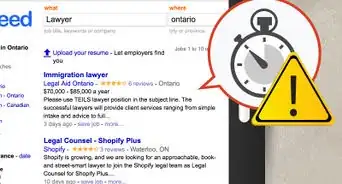This article was co-authored by wikiHow Staff. Our trained team of editors and researchers validate articles for accuracy and comprehensiveness. wikiHow's Content Management Team carefully monitors the work from our editorial staff to ensure that each article is backed by trusted research and meets our high quality standards.
There are 8 references cited in this article, which can be found at the bottom of the page.
This article has been viewed 35,201 times.
Learn more...
As a notary public, you perform many important actions. You can witness signatures, certify a copy of a negotiable instrument, and administer an oath or affirmation.[1] In Wisconsin, you can become a notary public by purchasing a notary seal or stamp as well as a surety bond. You will have to pass an exam and then submit a completed application. Your notary commission is good for four years.
Steps
Qualifying to Become a Notary
-
1Ensure that you don't have a disqualifying criminal history. You must show that you have a history of observing Wisconsin law. This means you can't have any disqualifying convictions or arrests. Obtain a copy of your criminal history.
- Generally, you cannot have been convicted of a felony or a misdemeanor involving public trust, unless you have been pardoned.[2]
-
2Satisfy other requirements. You must satisfy a series of requirements to qualify as a notary public. Specifically, make sure you satisfy each of the following:[3]
- You are a resident of the United States. (You do not have to be a resident of Wisconsin.)
- You are at least 18 years old.
- You have the equivalent of at least an eighth-grade education.
Advertisement -
3Pass an exam. You must take an online tutorial and pass an exam in order to become a notary in Wisconsin. You must have taken the exam within the past six months, and you must have scored at least 90%.[4] You should read this brochure before taking the exam: https://www.wdfi.org/Apostilles_Notary_Public_and_Trademarks/pdf/dfi-not-102P.pdf.
- You can begin the tutorial at this website: https://www.wdfi.org/apps/NotaryTutorialExam/TableOfContents.aspx.
- Once you pass the exam, print off the certificate. You must print it immediately, because the state office doesn't store test results.
Submitting Your Application
-
1Purchase a rubber stamp or notary seal. This seal or stamp must say “Notary Public,” “State of Wisconsin,” and your name. You may shorten your first name or use initials. However, you must always use your full legal last name.
- Remember to always sign your name in the manner it appears on your notary rubber stamp.[5] If the rubber reads "Chris Jones," don't sign "Christine Jones."
- You can purchase a stamp or seal online or from a local office supply store.[6] The store might want to see a notary certificate before they will order it for you. If this happens, have them contact the state office at 608-266-8915.
-
2Buy a surety bond. You'll need at least a $500 insurance bond to cover you in case you make a mistake. You can get this bond searching for “notary bonds in Wisconsin.” Alternately, you can ask a local insurance agent if they sell notary bonds.[7]
- The bond will cost $25-100.
-
3Complete an application. You can find an application at this website: https://www.wdfi.org/apps/notary/. Select “New Four Year Commission” if you are applying for the first time. You will complete the application online.
- The application contains an “oath of office” and a “bond form.” You will need to complete and submit both.
-
4Take an oath. You'll need to fill out your “oath of office” form and take an oath in front of a current notary. Have the form notarized.
- You can find a current notary in Wisconsin by visiting your nearest courthouse, town office, or large bank.
- You can also find a notary by using the American Society of Notaries locator here: https://www.asnnotary.org/?form=locator.
-
5Submit your application. Make a copy of the completed application for your records. You should then mail the application, bond form, exam certificate, and oath of office to Notary Records Section, Wisconsin Department of Financial Institutions, PO Box 7847, Madison, WI 53707-7847.
- Include a $20 filing fee. Make your check out to “Wisconsin Department of Financial Institutions.” If you applied online, then you will pay with a credit card at that time.
- You should hear within two weeks whether you have been approved.
-
6Purchase insurance. Your surety bond protects the public in case you make a mistake. However, you might want additional insurance, called “errors and omissions” insurance. This is optional but strongly recommended.
- Errors and omissions insurance will cover the defense of a lawsuit in case you are sued.[8]
- You can find errors and omissions insurance by contacting your local insurance agent.
-
7Renew your commission. The commission generally lasts four years, unless you are licensed to practice law in Wisconsin. Accordingly, you will need to renew before the deadline. You can renew by completing the same materials you did when you initially applied:
- purchase a new surety bond
- buy a new seal
- complete the renewal application, whether online or by download
- pay a $20 filing fee
References
- ↑ https://www.wisconsin.edu/risk-management/manual/notary-public/
- ↑ http://www.notarypublicstamps.com/become-a-notary/wisconsin/
- ↑ https://www.wdfi.org/apps/notary/NewFourYearInstructions.aspx
- ↑ https://www.wdfi.org/apps/notary/ExamInfo.aspx?filingType=NEW
- ↑ https://www.wisconsin.edu/risk-management/manual/notary-public/
- ↑ https://www.wdfi.org/Apostilles_Notary_Public_and_Trademarks/faq.htm
- ↑ https://www.wdfi.org/Apostilles_Notary_Public_and_Trademarks/faq.htm
- ↑ https://wisconsin.notarypublicunderwriters.com/wisconsin-notary-insurance
- ↑ https://www.wdfi.org/Apostilles_Notary_Public_and_Trademarks/pdf/dfi-not-102P.pdf





































































